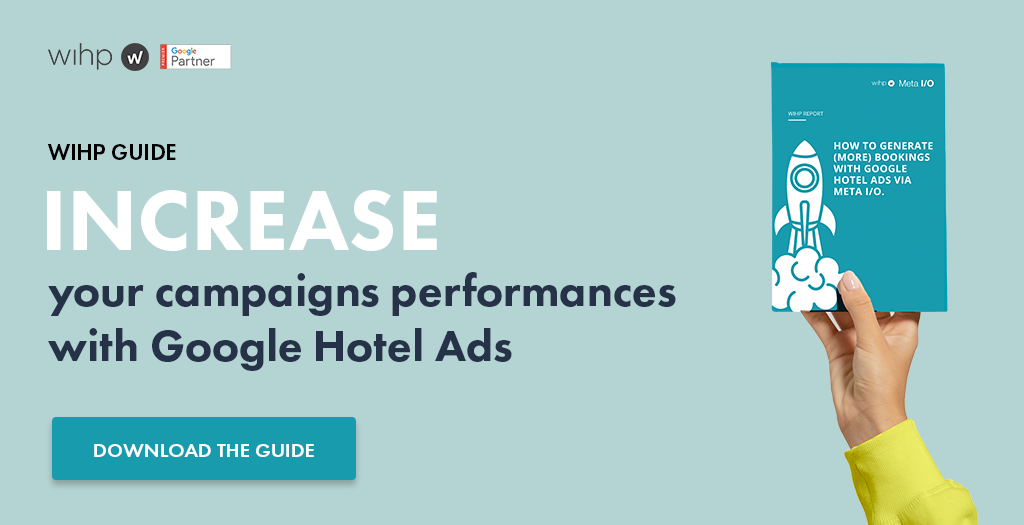
Why drive bookings with Google Hotel Ads
Google have become an essential direct booking tool in the hotel’s marketing strategy. Potential customers are using Google every day to make decisions about where to stay. Understanding demand has never been this critical to reemerge stronger. Google Hotel Ads can be a great help to reach more travelers to your hotel’s website.
20 years of milestones
Google has been working on improving its search results in travel since its inception. The first step can be traced back in 2000, with the launch of Google Ads (formerly Google Adwords), the famous advertising platform. Flash forward to 2019 and Expedia Group and Booking Holdings were investing a striking $11 billion on marketing, and mostly on Google Ads itself. In 2005, Google bought Where 2 Technologies, which became the foundation of Google Maps, while Street View was added in 2007, the same year of the launch of universal search, a crucial change in the way we discover and enjoy content (and hotels) online.

Before 2007, a standard Google search would only consist of ten organic links to websites and a few paid ads. After introducing universal search, however, a variety of sources started appearing in the search engine results pages, such as news, pictures, maps, and videos (it’s worth remembering that Google bought YouTube just the year before). With universal search, Marissa Mayer, former VP of search products and user experience, stated, “we’re attempting to break down the walls that traditionally separated our various search properties and integrate the vast amounts of information available into one simple set of search results.”
In 2009, Google launched the grandfather of Google Business Profile, which will play a significant role in the hotel distribution landscape later: Google Places, followed in 2011 by the introduction of Hotel Finder and Google Hotel Ads (formerly known as Hotel Price Ads, or HPA). It’s worth remembering the, now discontinued, 2016 travel app, Trips, as some of its contents went into the creation of google.com/travel in 2019.
In 2016, Google introduced Book On Google and the Room Booking Module, allowing guests to book their rooms in one click and hotels without good mobile experiences to receive bookings on mobile.
In more recent years, according to a study by one of the major reputation management tools, in 2019, Google became the most used hotel review website. In 2020, Google migrated the Pay-Per-Stay (PPS) model for hotels directly on Google Ads, a bidding strategy allowing hotels to pay for a Hotel Ads click only AFTER the guest stay has actually occurred, removing any risk of cancellation, particularly high during the first wave of lockdowns in the early months of the COVID-19 pandemic. In the same year, Google even removed the minimum commission of 10% to use this option.
Helping you drive more direct bookings
Thanks to such a suite of features, Google is now able to help hoteliers find potential travelers at each micro-moment, from top (I-want-to-get-away) to mid (Time-to-make-a-plan), to bottom-funnel (Let’s-book-it), together with the experience itself (Can’t-wait-to-explore). In a solid marketing strategy, therefore, Google can be used either as a brand awareness platform, as a source of incremental revenue, or as a channel shift from OTAs. Especially for the latter scenario, Google Hotel Ads remains one of the most reliable advertising arrows in one’s quiver, thanks to one of the highest ROAS when compared to more canonical advertising platforms.
Surprisingly, however, most hoteliers have not yet addressed the proverbial elephant in the room and keep underestimating the (huge) potential of the platform.

Here at WIHP with our metasearch manager Meta I/O, we analyzed thousands of clients investing in Google Hotel Ads, in order to recognize patterns and find possible fluctuations in spending, ROAS and conversion rate.
The data set is composed of 20% of independent properties and 80% of groups and chains, located all over the world. Get your full copy of our guide “How To Generate more bookings with Google Hotel Ads via Meta I/O” below:
